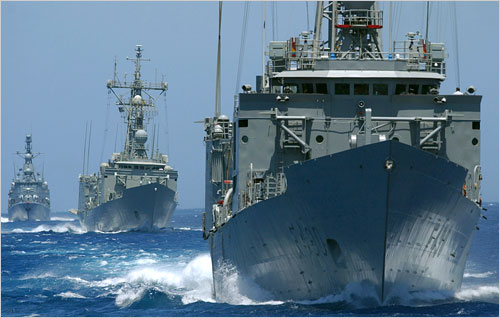- German chancellor called allies to send vessels to patrol the Turkish coast
- Defence ministers are considering military action to stop people smugglers
- Decision could be seen as admission that EU has failed to tackle the influx
- Downing Street refused to comment on whether British vessels are sent
- For more on the EU refugee crisis visit www.dailymail.co.uk/refugeecrisis
Warships
will be deployed to stop migrants crossing the Aegean Sea to Europe,
under a plan to be discussed by Nato defence chiefs today.
German chancellor Angela Merkel last night called on allies to send vessels to patrol the Turkish coast in a dramatic escalation of the response to the crisis.
Today at a meeting in Brussels, defence ministers will consider the request – supported by Turkey – for military action aimed at preventing people-smuggling gangs sending boatloads to Greek islands.
German chancellor Angela Merkel last
night called on allies to send vessels to patrol the Turkish coast
(pictured, migrants arrive on Greek island of Lesbos) in a dramatic
escalation of the response to the crisis
A
decision to intervene by the 28 Nato members, including Britain, will be
seen as an admission that the EU has failed to tackle the problem.
Nato
secretary general Jens Stoltenberg last night said its members 'see the
need to manage and to tackle the human tragedy' caused by the migrant
crisis.
'I
think we will take very seriously the request from Turkey and other
allies to look into what Nato can do to help them cope and deal with the
crisis and all the challenges they face, not least in Turkey,' he
added.
Germany
and Turkey put forward the appeal for military intervention after Mrs
Merkel flew to Ankara to meet with Turkish prime minister Ahmet
Davutoglu.
She
said they had agreed the Nato defence ministers' meeting should discuss
how the alliance 'can be helpful with the surveillance situation' in
the Mediterranean and assist the Turkish coast guard and EU border
agency.
German chancellor Angela Merkel last
night called on allies to send vessels to patrol the Turkish
coast (pictured, migrants arrive on Greek island of Lesbos after
crossing Aegean)
The
Nato defence ministers will also review their response to a more
assertive Russia. Mr Stoltenberg, Norway's former prime minister, said
Russian involvement in Syria was 'undermining' peace efforts and 'making
a desperate situation worse', adding: 'Calm and easing tensions is more
important than ever.'
Downing Street last night struck a cautious note and refused to comment on whether British vessels could be sent.
The
Prime Minister's official spokesman said the Government was 'supportive
of looking at ways to help Turkey deal with the huge burden it has from
refugees'.
She
pointed out that the Royal Navy is already involved in efforts to stem
the flow of migrants across the Mediterranean. But she stressed that
talks were at a very early stage with 'no proposals' yet on the table.
Douglas
Lute, US ambassador to Nato, appeared to voice frustration that the EU
had not been able to manage the crisis, but said the German-Turkish
request would not be unusual as member states regularly ask for help.
A decision to intervene by the 28 Nato
members will be seen as an admission that the EU has failed to tackle
the migrant problem (pictured, migrants arrive on Greek island of Lesbos
after crossing Aegean)
He
said the EU had 'primary responsibility' for tackling the problem,
adding: 'This is fundamentally an issue which should be addressed a
couple of miles from here, in the EU [headquarters].'
European
Commission spokesman Margaritis Schinas said: 'We welcome all
discussions on potential measures which could contribute to addressing
the refugee crisis, save lives at sea and improve the management of
migratory flows and borders.'
The
Royal Navy has been part of an EU operation in the Mediterranean since
May last year, tackling people-smuggers between Libya and Italy.

No comments:
Post a Comment